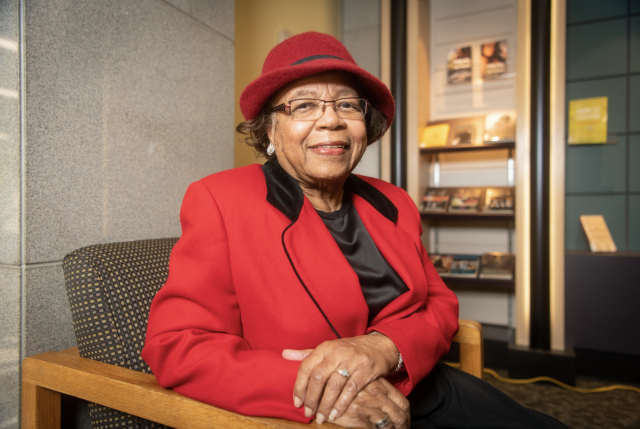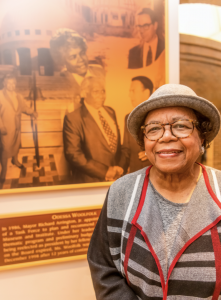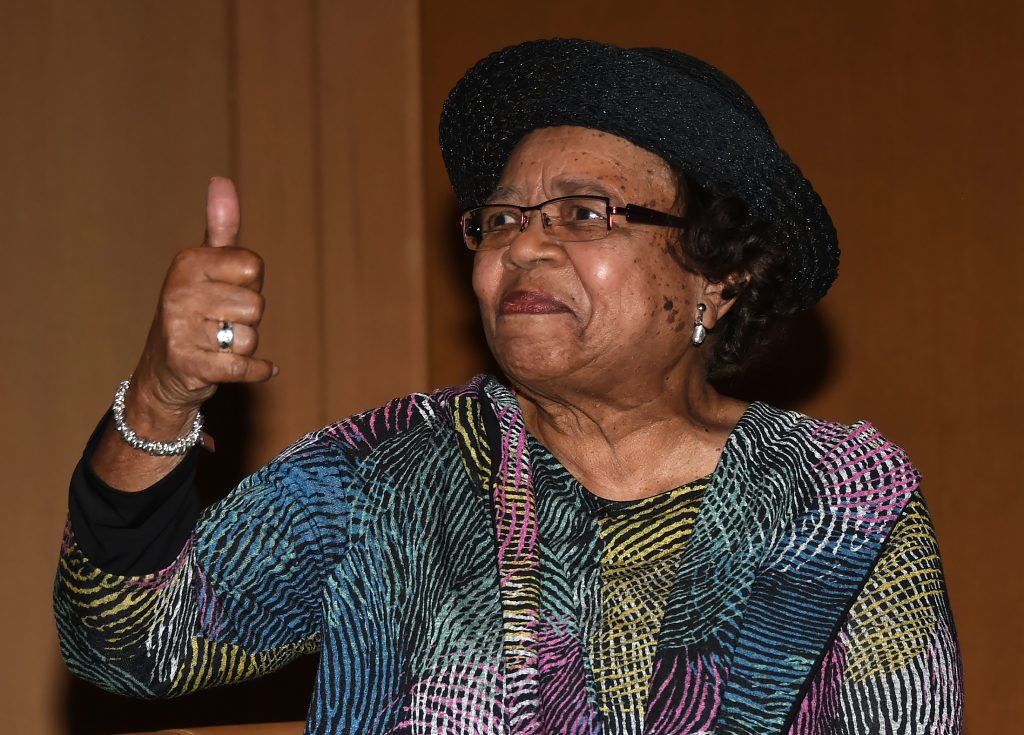
By Javacia Harris Bowser
For The Birmingham Times
It’s a sunny fall afternoon, and Odessa Woolfolk has made her way to the Titusville branch of the Birmingham Public Library for an interview—something that is rare for Woolfolk who is often reluctant to do media, preferring instead to focus on doing the work that’s made her one of Birmingham’s most celebrated citizens.
To people in Birmingham and beyond, Woolfolk is a living legend. Her role in turning the dream of a Birmingham Civil Rights Institute into a reality may be one of her best-known contributions, but that only scratches the surface of all that she’s done for the Magic City.
Woolfolk’s influence dates back to teaching history at Birmingham’s Samuel Ullman High School at the height of the Civil Rights Movement of the 1960s — when she gave her students a safe space to let their voices help dismantle segregation — and continues to this day, with her being honored in October during the City of Birmingham Office of Social Justice and Racial Equity’s annual AWAKEN event, where Mayor Randall Woodfin presented her with the prestigious Putting People First Award.
In between, Woolfolk has served as director of the Center for Urban Affairs at the University of Alabama at Birmingham (UAB), where she’s also been an adjunct lecturer in the Department of Political Science and Public Affairs and served as a special assistant to the university’s president and director of community relations.
In addition, she has served on the boards of more than a dozen community organizations, including the United Way, the Alys Stephens Center, and the Birmingham Urban League.
Aside from being presented with numerous awards—the UAB Honorary Alumni Award, Outstanding Faculty Award, and President’s Medal, among others—Woolfolk has had awards named in her honor, including the Odessa Woolfolk Presidential Community Service Award, which was established by UAB when she retired in 1993. She’s also been inducted into the Birmingham Gallery of Distinguished Citizens and the “Odessa Woolfolk Gallery” at the Birmingham Civil Rights Institute (BCRI) is named in her honor.
With all that Woolfolk has accomplished, she is first and foremost a teacher and her goal is always to teach a lesson. There’s an Ethiopian proverb that states, “She who learns teaches.” Woolfolk’s life is the epitome of this mantra.
“You’ve got to step up, even before you’re asked,” Woolfolk said about the lessons she hopes her legacy can teach.
The Titusville Library was the perfect setting for Woolfolk’s 90-minute talk with The Birmingham Times. The symbolism is rich, reflecting both Woolfolk’s lifelong love of books and the community that shaped her.
“I think it made all the difference in the world,” she said of growing up in Titusville. At the time, the neighborhood was thriving with strong schools, vibrant churches, and residents of various professions, including doctors, lawyers, carpenters, miners, and beauticians.
“We were a self-contained village,” Woolfolk said. “We knew about segregation, but it didn’t keep us from enjoying what we had.”
Neighbors were like family, and the community was always buzzing with activities for children and adults.
“I feel that that settled me,” she said. “It gave me a sense that I was somebody.”
“Trust Your Teacher”

From a very early age, Woolfolk knew she would be a teacher. During playtime at home, she would often line up her dolls and launch into a lesson about whatever was on her mind that day. Woolfolk’s mother and most of the women in her family were educators. Teachers were her heroes.
“I adored my teachers,” said Woolfolk who attended Birmingham’s Washington Elementary School and Ullman and A.H. Parker High Schools. “I can still name them even now. Teachers were just so important to me as people who you could trust. You could always trust your teacher.”
Her favorite teacher was Mrs. Blanche Martin, who taught algebra at Ullman High School. Mrs. Martin helped students understand that math was important in everyday living, Woolfolk said. The beloved instructor also shared her homemade lunches with her students, something Woolfolk remembers fondly. Most of all, Mrs. Martin took an interest in her students’ daily lives, Woolfolk added: “She convinced me that character mattered, no matter what grades you made.”
At AWAKEN: Building the Beloved Community—Celebrating Odessa Woolfolk, which was held in the auditorium of the Birmingham Museum of Art during Magic City Classic weekend, Mayor Woodfin shared a letter from several of Woolfolk’s former students, who still consider Woolfolk one of their greatest influences decades after being in her classroom.
Woolfolk, however, is quick to say her students taught her as much as she taught them.
“I learned from many of the kids how to handle adversity,” she said of her students who came from troubled or disadvantaged homes. “But I was most impressed with the ones who went to march during the Civil Rights Movement. Many were told by their parents not to participate, but they believed so much that this movement would help them have a better future and they were brave enough to go. It was that bravery, that risk-taking that I respected in them.”
She Who Learns, Teaches
Always on a quest for knowledge, Woolfolk has a bachelor’s degree in history and political science from Talladega College and master’s degree in urban studies from Occidental College in California. She’s done additional graduate studies at the University of Chicago and Yale University.
Since college her personal creed has been, “Only enlightened, intelligent personal concern for the world in which we live can solve the problems of our day.”
Woolfolk has extensive experience and expertise in urban planning and policy, civic engagement, and community development.
After her time teaching at Ullman High, Woolfolk left Birmingham in 1964 in search of a better life. “I was just fed up,” she said.
Living in the Jim Crow South had taken its toll. During her time away, she worked to improve underserved communities in places like Utica and Albany, New York. She served as the program director for Albany’s Interracial Council, was a field supervisor for a special project with the New York State Department of Health and did work with the Young Women’s Christian Association (YWCA). But Birmingham was always on her mind.
“I learned a lot and I kept thinking, ‘We’ve got problems like this back home,’” Woolfolk said.
After doing urban development and public policy work throughout New York state, as well as in Washington, D.C., and Boston, Massachusetts, Woolfolk returned to Birmingham in the 1970s in hopes of sharing with the city’s leaders and community organizers what she’d gleaned from working outside the South.
“I felt that I was in a better position, having gone to all these places to learn more about urban planning, urban policy, and race relations, because I had interacted with all kinds of ethnic groups and learned about different cultures, so I was ready to come home and share my new knowledge,” she said. “It’s always about teaching. It’s always about learning the best way to get things done.”
Top Influencer

When Woolfolk was honored at the AWAKEN event, the auditorium of the Birmingham Museum of Art was packed. It was a cool and rainy day, but that didn’t stop Birmingham from showing up for a woman who has always shown up for them. Woolfolk received a standing ovation the moment she took the stage.
Throughout the hour, various community leaders spoke about Woolfolk’s impact. When one speaker boasted of Woolfolk’s intelligence and integrity, the honoree bashfully covered her face for a few seconds. Despite all the accolades Woolfolk has received over the years, it’s obvious that she hasn’t gotten used to this kind of attention.
Samuetta Nesbitt, senior vice president of public relations and community affairs at United Way of Central Alabama and one of Woolfolk’s close friends, took to the podium and declared that Woolfolk was an influencer long before social media existed.
“I have so much respect for the way she navigates the mine fields of community service,” said Nesbitt, who has served with Woolfolk for several networks and organizations. No matter how contentious committee meetings would become, Woolfolk kept her cool.
“What I most observed was that she came with just the facts,” Nesbitt said. “She didn’t argue, but she challenged everyone with facts.”
While Woolfolk still volunteers, she tells the audience at AWAKEN that she’s at a point in her life where she wants to have more fun. Cheers from the audience seem to say she deserves it.
As the COVID-19 pandemic gets under control, Woolfolk hopes to get back to some of her favorite pastimes—dining out with friends, going to the theater, visiting local cultural attractions, playing card games like Bridge, Poker, and Bid Whist. She also enjoys traveling to visit her nieces and nephews, who are scattered across the country from California to Virginia.
A voracious reader since childhood, Woolfolk has a home filled with books. She likes newspapers and magazines, too, and has read the New York Times every day since college. Growing up she loved reading biographies of influential Black people like educator and orator Booker T. Washington, scientist and inventor George Washington Carver, and political scientist and diplomat Ralph Bunche.
“I looked at their lives and saw Black people who were getting places and doing things,” she said.
Later she was deeply moved by the biographies of women like educator and activist Mary McLeod Bethune and former First Lady of the United States Eleanor Roosevelt, struck by their love for their communities.
When reading biographies, Woolfolk often seeks the answer to one question: “What made that person do that?”
So, what made Woolfolk devote her life to improving the world around her?
Woolfolk credits the Girl Scouts, the local youth chapter of the National Association for the Advancement of Colored People (NAACP), and Talladega College with nurturing her passion for service, but she said it began at an even younger age.
“This sounds trite, but I really think I thought about that in kindergarten, where you were told you were to respect other people and to go out into the world and be a good person,” she said. “I just thought that you were supposed to be a servant.”
For Woolfolk, being a servant means being a teacher—always.
When she took the microphone at AWAKEN, she said, “You can’t leave without a message from the teacher.”
And her lesson was simple but strong — “Bloom where you are, give whatever your gift is,” Woolfolk said. “That’s the only way we can strengthen our communities.”
Odessa Woolfolk Honors
Civic Boards
–Region 2020,
–YWCA of Birmingham,
–Community Foundation of Greater Birmingham,
–Regional Planning Commission of Greater Birmingham,
–Operation New Birmingham,
–Birmingham Museum of Art, Birmingham Urban League
–UAB Educational Foundation
–Leadership Birmingham (founding member of the board)
–Martin Luther King Unity Breakfast (founding co-chair)
–First Congregational Church (trustee and moderator)
–National Conference of Christians and Jews. (chaired the Alabama chapter)
Awards
–2016 Vulcan Award (Lifetime Achievement)
–UAB Honorary Alumni Award,
–UAB Outstanding Faculty Award,
–UAB President’s Medal,
–Odessa Woolfolk Presidential Community Service Award. (Created in honor of)
–Alabama Humanities Foundation (Humanities Award)
–Talladega College (Honorary Degree)
–Birmingham-Southern College (Honorary Degree)
–the University of the South in Sewanee, Tennessee (Honorary Degree)
–Birmingham Gallery of Distinguished Citizens (1994)
–Alabama Academy of Honor (2008)
Of Note
–Helped establish the Birmingham Civil Rights Institute (BCRI), which opened in 1993.
–Served as chair of the task force and as the institute’s founding administrator
–The “Odessa Woolfolk Gallery” at the BCRI is also named in her honor.




